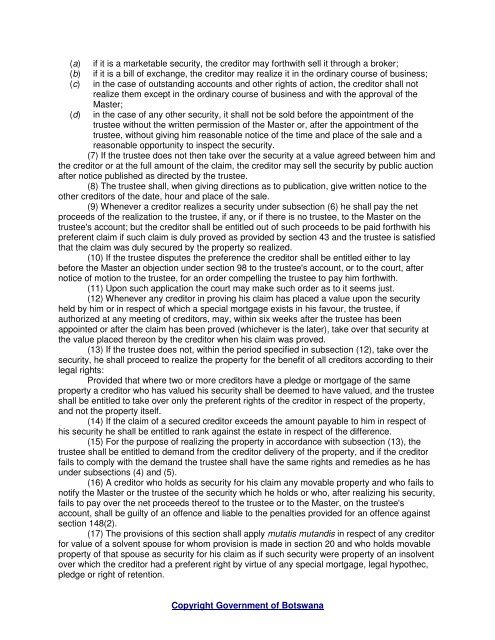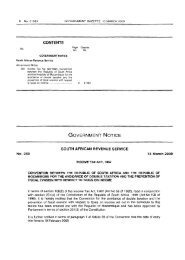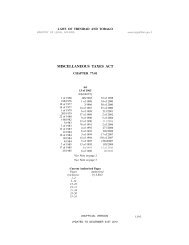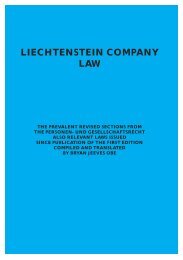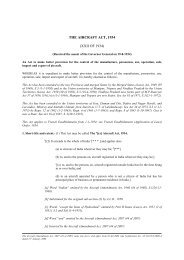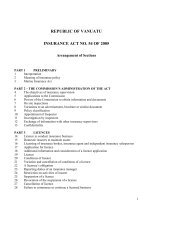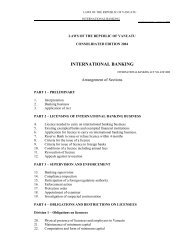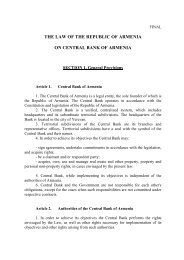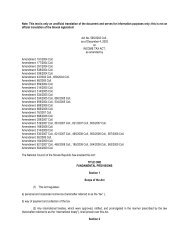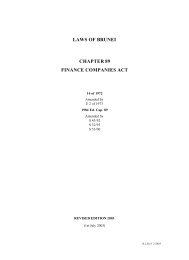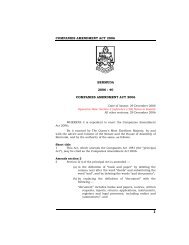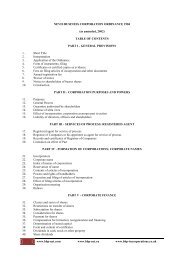Insolvency Act.pdf - Intax Info
Insolvency Act.pdf - Intax Info
Insolvency Act.pdf - Intax Info
Create successful ePaper yourself
Turn your PDF publications into a flip-book with our unique Google optimized e-Paper software.
(a)<br />
(b)<br />
(c)<br />
(d)<br />
if it is a marketable security, the creditor may forthwith sell it through a broker;<br />
if it is a bill of exchange, the creditor may realize it in the ordinary course of business;<br />
in the case of outstanding accounts and other rights of action, the creditor shall not<br />
realize them except in the ordinary course of business and with the approval of the<br />
Master;<br />
in the case of any other security, it shall not be sold before the appointment of the<br />
trustee without the written permission of the Master or, after the appointment of the<br />
trustee, without giving him reasonable notice of the time and place of the sale and a<br />
reasonable opportunity to inspect the security.<br />
(7) If the trustee does not then take over the security at a value agreed between him and<br />
the creditor or at the full amount of the claim, the creditor may sell the security by public auction<br />
after notice published as directed by the trustee.<br />
(8) The trustee shall, when giving directions as to publication, give written notice to the<br />
other creditors of the date, hour and place of the sale.<br />
(9) Whenever a creditor realizes a security under subsection (6) he shall pay the net<br />
proceeds of the realization to the trustee, if any, or if there is no trustee, to the Master on the<br />
trustee's account; but the creditor shall be entitled out of such proceeds to be paid forthwith his<br />
preferent claim if such claim is duly proved as provided by section 43 and the trustee is satisfied<br />
that the claim was duly secured by the property so realized.<br />
(10) If the trustee disputes the preference the creditor shall be entitled either to lay<br />
before the Master an objection under section 98 to the trustee's account, or to the court, after<br />
notice of motion to the trustee, for an order compelling the trustee to pay him forthwith.<br />
(11) Upon such application the court may make such order as to it seems just.<br />
(12) Whenever any creditor in proving his claim has placed a value upon the security<br />
held by him or in respect of which a special mortgage exists in his favour, the trustee, if<br />
authorized at any meeting of creditors, may, within six weeks after the trustee has been<br />
appointed or after the claim has been proved (whichever is the later), take over that security at<br />
the value placed thereon by the creditor when his claim was proved.<br />
(13) If the trustee does not, within the period specified in subsection (12), take over the<br />
security, he shall proceed to realize the property for the benefit of all creditors according to their<br />
legal rights:<br />
Provided that where two or more creditors have a pledge or mortgage of the same<br />
property a creditor who has valued his security shall be deemed to have valued, and the trustee<br />
shall be entitled to take over only the preferent rights of the creditor in respect of the property,<br />
and not the property itself.<br />
(14) If the claim of a secured creditor exceeds the amount payable to him in respect of<br />
his security he shall be entitled to rank against the estate in respect of the difference.<br />
(15) For the purpose of realizing the property in accordance with subsection (13), the<br />
trustee shall be entitled to demand from the creditor delivery of the property, and if the creditor<br />
fails to comply with the demand the trustee shall have the same rights and remedies as he has<br />
under subsections (4) and (5).<br />
(16) A creditor who holds as security for his claim any movable property and who fails to<br />
notify the Master or the trustee of the security which he holds or who, after realizing his security,<br />
fails to pay over the net proceeds thereof to the trustee or to the Master, on the trustee's<br />
account, shall be guilty of an offence and liable to the penalties provided for an offence against<br />
section 148(2).<br />
(17) The provisions of this section shall apply mutatis mutandis in respect of any creditor<br />
for value of a solvent spouse for whom provision is made in section 20 and who holds movable<br />
property of that spouse as security for his claim as if such security were property of an insolvent<br />
over which the creditor had a preferent right by virtue of any special mortgage, legal hypothec,<br />
pledge or right of retention.<br />
Copyright Government of Botswana


